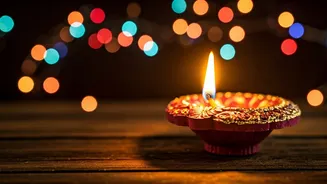Diwali: A Tradition
Diwali, often recognized as the 'Festival of Lights,' stands as one of India's most important and widely celebrated festivals. It marks the victory of light
over darkness and symbolizes the triumph of good over evil. Celebrated over five days, Diwali typically occurs in the months of October or November according to the Gregorian calendar. The dates fluctuate annually based on the position of the moon. During Diwali, homes are decorated with lights, lamps, and colorful rangoli designs to welcome Lakshmi, the goddess of wealth and prosperity. The festivities include family gatherings, exchanging gifts, the consumption of sweets, and the setting off of fireworks. The core significance of Diwali lies in its ability to bring communities together, promoting a sense of unity and shared celebration. This festival is deeply rooted in Indian culture and continues to be observed with great enthusiasm and devotion across the country.
Dates & Timing
Determining the exact dates for Diwali in 2025 requires referencing the Hindu lunar calendar, which influences the festival's timing. Typically, the primary day of Diwali is celebrated on the darkest night, which coincides with the new moon. Given that the lunar calendar shifts each year, the Diwali dates can vary significantly. In preparation for the 2025 Diwali season, it would be wise to consult almanacs and calendars which are regularly updated, offering the most accurate and recent information. Keep in mind that preparations for Diwali start weeks in advance, from buying gifts and decorations to planning family reunions. People generally start their Diwali shopping well before the official dates to have ample time to prepare their homes and finalize travel plans.
Rituals and Customs
Diwali is a kaleidoscope of traditions and rituals, all deeply embedded in cultural practices. The celebrations usually commence with Dhanteras, the first day, marked by shopping for gold, silver, or new utensils. The second day is Naraka Chaturdasi, which is associated with the early morning ritual of anointing the body with oil, known as Abhyanga Snan, as a cleansing ritual. The primary day is Lakshmi Puja, when people pray to Goddess Lakshmi for prosperity and wealth. The homes are lit with diyas, or oil lamps, to invite the goddess's blessings. The following day, Govardhan Puja, observes the legend of Lord Krishna lifting the Govardhan Hill. The final day is Bhai Dooj, where sisters pray for the well-being of their brothers. These five days encompass a vibrant array of traditions that weave the cultural significance of Diwali.
Celebratory Traditions
The spirit of Diwali extends beyond religious observances, with vibrant celebrations across the nation. Families and friends come together to exchange gifts, sweets, and share festive meals. Fireworks displays are common, lighting up the night sky with stunning visual effects. Homes are adorned with colorful decorations, including vibrant rangoli patterns, candles, and electric lights. Shopping is an integral part of Diwali, as people buy new clothes, jewelry, and other items. The festival fosters a spirit of unity and joy, with everyone participating in the celebrations. These practices vary from region to region, reflecting the diverse cultural fabric of India. Diwali is, at its heart, about fostering a sense of happiness, togetherness, and optimism for the future.
Regional Variations
The celebration of Diwali is not just a monolithic event; it takes on distinct forms throughout India. In various states, unique traditions and practices add to the festival's diverse flavor. For instance, in some southern states, the festival may incorporate specific rituals and offerings. In the north, the focus might be on different deities and mythological stories. The cuisine also changes regionally, with each state preparing its signature dishes and sweets to celebrate the festival. These local variations highlight the rich tapestry of Indian culture. Despite regional differences, the core themes of triumph over evil, the importance of family, and the celebration of prosperity remain constant. Understanding these variations gives one a deeper appreciation for the significance of Diwali in India.
Looking Ahead To 2025
As we anticipate Diwali 2025, one can expect several ongoing trends to continue. The use of technology in celebrations, from online shopping to virtual gatherings, is likely to expand. The trend toward eco-friendly practices will probably gain further momentum, including the use of sustainable decorations and reducing the use of fireworks. The economic landscape may have an impact on consumer spending during the festival. The entertainment sector is also likely to adapt, with special television programs, films, and music releases themed around Diwali. Overall, Diwali 2025 will blend traditional values with contemporary trends, showing the festival's enduring relevance and its ability to adapt to changing times while maintaining its core cultural significance.













